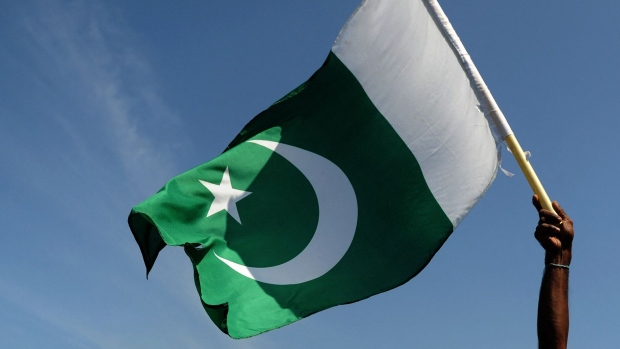Jan 16, 2024
Pakistan Condemns Iran Over Deadly Strike Inside Its Territory
, Bloomberg News

(Bloomberg) -- Iran conducted a missile strike on a militant group in Pakistan, sparking a diplomatic crisis between the neighboring countries at a time of rising regional tensions.
Pakistan said it’s recalling an ambassador to Iran and barring Tehran’s envoy from re-entering the country over the “unprovoked and blatant breach” of its sovereignty.
The attack marks a sharp escalation of Iran’s campaign against Jaish al-Adl, a separatist group based in Pakistan. Iran’s Tasnim news agency said two bases belonging to the militants in Balochestan province were destroyed late on Tuesday with missiles and drones.
Jaish al-Adl is a Sunni group that operates along predominantly Shiite Iran’s porous border with nuclear-armed Pakistan. It’s launched multiple attacks on Iranian security forces, most recently a December assault on a police station that killed 11 people. Iran and the US both consider it a terrorist group.
The strike came as tension rippled through the Middle East over the war between Israel and Iran-backed Hamas, which has been raging in Gaza for more than 100 days. The Houthi group in Yemen, also backed by Iran, has been escalating assaults on shipping in the Red Sea, drawing counter attacks from the US and its allies.
Pakistan, which said the strike killed two children and injured three others, became the second of Iran’s neighbors to complain of an attack by the Islamic Republic on its soil within 24 hours. Earlier Tuesday, Iraq criticized a deadly Iranian missile hit on an alleged Israeli spy base in Iraqi Kurdistan.
100 Days After Shock Hamas Attack, Israel Is Not Backing Down
“Pakistan reserves the right to respond to this illegal act,” the government said. “The responsibility for the consequences will lie squarely with Iran.”
“We have to seek talks to eliminate the root causes of the issue, whether ungoverned spaces in Iran which are used against Pakistan or ungoverned spaces in Pakistan which may be used by terrorists against Iran,” said Mushahid Hussain Sayed, chairman of the Pakistani Senate’s defense committee.
The attack on Pakistan came hours after Iranian Foreign Minister Hossein Amirabdollahian met Pakistan’s Prime Minister Anwaar-ul-Haq Kakar in Davos on Tuesday. Amirabdollahian told Kakar the two countries should follow up on previous agreements about fighting terrorism, a ministry statement said, without elaborating.
The two countries held joint naval drills in the Persian Gulf and Strait of Hormuz on Wednesday, Iran’s semi-official news agency Mehr reported.
Saudi Arabia ‘Incredibly Concerned’ About Regional Security
Separately, Mehr said Iran’s security forces clashed with a “terrorist group” at an outpost near a restive border area with Pakistan on Wednesday, where one member of the group died in an exchange of fire. The terrorists aimed to “carry out sabotage” in Iran, Mehr reported, without providing more details.
Call for Restraint
China, which counts both countries as strategic allies, expressed concern over the ramp-up in tensions.
“We urge the two sides to exercise restraint, avoid any actions that escalate the tensions, and jointly safeguard peace and stability in the region,” Mao Ning, spokesperson for China’s ministry of foreign affairs, said at a regular Beijing briefing.
Iran earlier this week launched separate strikes on ISIS targets in Syria in response to a deadly bombing claimed by the group this month.
“It doesn’t make a difference for us where the Islamic Republic is being threatened from,” Iranian Defense Minister Mohammad-Reza Ashtiani said in televised comments on Wednesday, without mentioning specific countries. “We will have a proportionate, decisive and firm reaction.”
--With assistance from Kamran Haider, Martin Ritchie, Arsalan Shahla and Demetrios Pogkas.
(Updates with Pakistan statement in fifth paragraph, border clash in 11th)
©2024 Bloomberg L.P.








